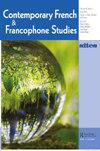French Narrative Theory and the Boom of Chinese Narrative Studies
IF 0.2
4区 文学
0 LITERATURE, ROMANCE
引用次数: 0
Abstract
Abstract The 1980s, an era in the wake of opening-up policy after the cultural revolution, witnessed an unprecedented passion for Chinese critics to read, embrace and import Western theories, among which French narrative theory deserves a particular mention. To a large extent, it is French narrative theory that has led to the upsurge and explosion of Chinese narrative studies, which prevails in the 21st century. This paper, first of all, connects the boom of Chinese narrative studies with French narrative theory which was translated and warmly received in Chinese academia in the 1980s. Second, it attempts to examine the travelling, the impact and the after-life of French narrative theory in China, arguing that inspired by their French predecessors, Chinese narrative theorists have cultivated their increasing interest in the narrative form of literary works and developed Chinese narratology with special reference to Chinese narrative traditions. Third, it investigates how Chinese narratologists foster theoretical dialogues with their French colleagues by challenging and revising some narratological concepts. Finally, it calls for a narratology beyond French structuralism by proposing comparative and transcultural perspectives on narrative studies with the aim to draw scholarly attention to those neglected and peripheral narratives and to subvert the hegemony of Anglo-American narrative theory.法国叙事理论与中国叙事研究的繁荣
摘 要 20 世纪 80 年代是文化大革命后实行改革开放政策的年代,中国评论界阅读、接受和引进西方理论的热情空前高涨,其中法国叙事理论尤其值得一提。在很大程度上,正是法国叙事学理论带动了中国叙事学研究在 21 世纪的蓬勃发展。本文首先将中国叙事学研究的蓬勃发展与 20 世纪 80 年代在中国学术界翻译并受到热烈欢迎的法国叙事学理论联系起来。其次,本文试图考察法国叙事学理论在中国的游历、影响和后世,认为中国叙事理论家在法国前辈的启发下,对文学作品的叙事形式产生了越来越浓厚的兴趣,并特别参照中国的叙事传统发展了中国叙事学。第三,研究中国叙事学家如何通过挑战和修正一些叙事学概念来促进与法国同行的理论对话。最后,通过提出叙事学研究的比较和跨文化视角,呼吁建立一种超越法国结构主义的叙事学,以引起学者对那些被忽视的边缘叙事的关注,并颠覆英美叙事理论的霸权。
本文章由计算机程序翻译,如有差异,请以英文原文为准。
求助全文
约1分钟内获得全文
求助全文
来源期刊

Contemporary French and Francophone Studies
LITERATURE, ROMANCE-
CiteScore
0.30
自引率
0.00%
发文量
43
期刊介绍:
An established journal of reference inviting all critical approaches on the latest debates and issues in the field, Contemporary French & Francophone Studies (formerly known as SITES) provides a forum not only for academics, but for novelists, poets, artists, journalists, and filmmakers as well. In addition to its focus on French and Francophone studies, one of the journal"s primary objectives is to reflect the interdisciplinary direction taken by the field and by the humanities and the arts in general. CF&FS is published five times per year, with four issues devoted to particular themes, and a fifth issue, “The Open Issue” welcoming non-thematic contributions.
 求助内容:
求助内容: 应助结果提醒方式:
应助结果提醒方式:


